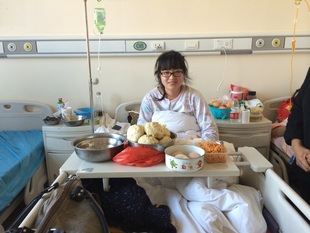
Dr. Han is well-known for treating polycystic ovarian syndrome (PCOS), dysfunctional uterine bleeding, irregular menstruation, for giving pre-natal care (especially for those with a gynaecological condition) and for "holding" the baby to avoid miscarriage.
She had a very busy clinic yesterday morning. She was quick and efficient, but clearly gave her patients a lot of attention and care. We saw many many cases of Kidney Deficiency, especially in problems of irregular menstruation or amenorrhoea.
But what struck us the most is the lack of privacy, especially for a place as intimate as a gynaecology clinic. At the back of Dr Han's office is an examination table with stirrups (very old fashioned!), separated from the main area with a pink room divider. Every so often, Dr Han got up to examine a patient, who had been prepped by a student and had undressed and climbed on to the table. Bearing in mind that the clinic is heaving with patients and relatives, it soon became apparent that it's considered normal for other patients to look at what's going on behind the screen. I know that the Chinese have a different concept of privacy, so I tried not to feel too sorry for the patients. At least men were not allowed in the room!
This morning we did the round of the 4th floor gynae ward with Dr Zhang and two of her students. I think we saw a total of 20 patients. There were a few cases of surgery (an 82-year-old woman with vaginal tumours, and a woman in her 30s who had a hysterectomy) -- but the vast majority of patients were there because they were in the early stage of pregnancy and had threatened abortion (in danger of miscarriage). The standard treatment seemed to be lots of rest (with an average stay of one month in the hospital), injections of progesterone, and Chinese herbs.
Clearly there are big cultural differences between China and the UK for this sort of problem. My classmate Sharmin said that in the UK, women with this condition would simply be told to go home and rest. And then there is the argument that if your foetus is not strong enough to survive the first trimester, a miscarriage is (probably) nature's way of "healthy-baby selection".
Our translator said that in China, the pressure to have a baby is so strong, it (probably) overrides this ethical dilemma. There is clearly a strong demand for this service, such that someone like Dr Han has made a reputation for being able to "hold the baby".
And then there are other issues like artificial progesterone being injected into women's bodies. What implications does this have for the baby and the woman's health later on? I would love to see research into this.
Finally, I took a photo of a woman in the ward who was being fed a mountain of baozi (stuffed buns) and noodles by her mother (or maybe a mother-in-law?). I asked her permission for me to take this picture. I found her so beautiful, especially as she tucked into her lunch. Ethical dilemma aside, I hope she holds her baby to full term.
P.S. My classmate Kat later passed on a research paper from mainland China that looked into the effects of the use of progesterone in cases of threatened abortion. It found no difference in terms of birth weight of babies between those who were given progesterone treatment and with a control group. Interesting.
 RSS Feed
RSS Feed